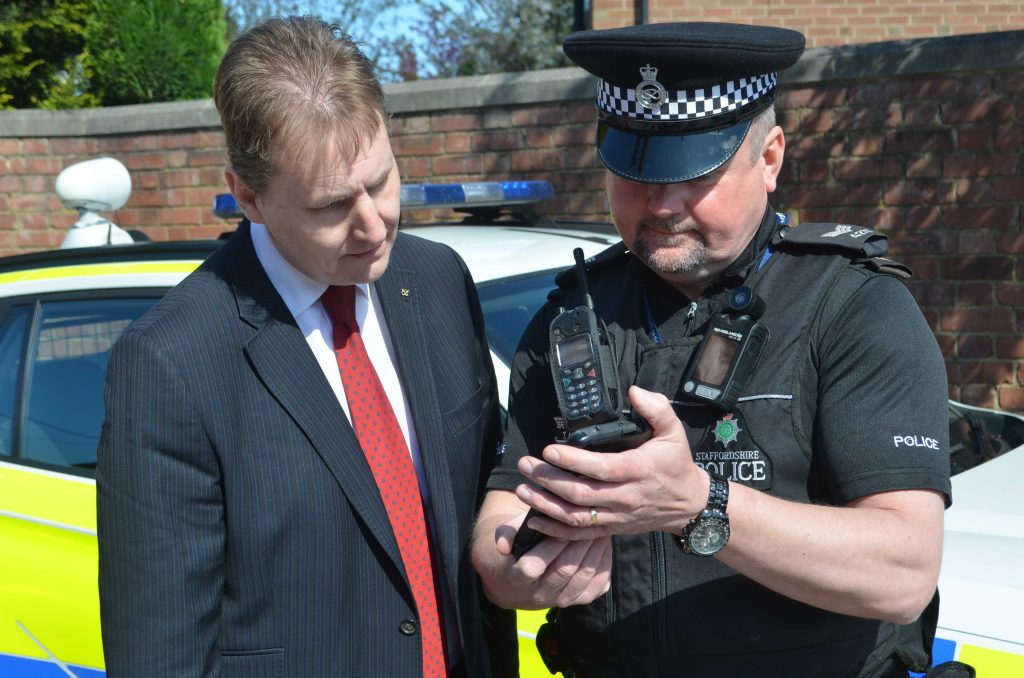Police will be more visible to local people because they can do key work using new mobile technology introduced by Staffordshire’s Police and Crime Commissioner Matthew Ellis.
All frontline police officers and PCSOs across Staffordshire have been equipped with new smartphone and tablet devices to give them the information and tools they need at their finger-tips. This will stop them having to return to stations to complete paperwork, submit reports or statements, and access files.
In the past few weeks, new updates were rolled-out on the mobile devices to help officers carry out searches for missing people, update and complete crime tasks, and search electronic stop and search records while on the beat. Before the new updates officers could already access seven key processes thanks to the technology.
Early indications are that over the next 12 months officers will begin to save significant amounts of time and be more visible in communities.
Mr Ellis said: “I want to be sure officers have the right tools for the job. The top priority is to get officers out and about – more visible and more available. These new processes mean officers can spend less time on admin in a police station and more time in the communities they serve.
“It’s early days, but the feedback I’ve had from officers about this new technology has been positive. They’re amazed at how good the technology is and the potential it has to free them up to be out of police stations and on the streets.
“Over the next 12 months, police visibility will rise because of this new technology. When fully bedded in, it will help free up an extra 250,000 hours of police time to be out on the beat a year which is the equivalent of an extra 100 officers on duty.
“It is pioneering work that puts Staffordshire ahead of the majority of forces in the country, but more importantly we are taking a significant step to delivering the kind of policing local people tell me they want and need.
“This is part of wider investment in technology that will dramatically improve Staffordshire Police’s intelligence capability and make it the most efficient, agile and effective police force in the country. It’s not about how much money is spent, but how well it is spent.”
Sergeant Tyrone Kerr, one of the first officers to use mobile technology, said: “The new smart technology being introduced will give officers more control over our time. Rather than having to call back in to an office or police station, we can complete what we have to do while we’re still out and about. This gives us the ability to stay out of the office for longer following up enquiries and talking to people we need to engage with. We can spend more time out in the community doing the things we joined the police service to do.”
Officers are able to perform far more activities away from police buildings through a range of apps which are tailored to their role. Each device has access to key processes such as taking electronic witness statements, stop and search forms, missing people reports and crime scene management. It will also allow officers to share information – such as domestic abuse risk assessments – directly with other agencies at the touch of a button. At least 20 more processes are on their way, meaning officers can spend more time doing the job and less on red tape.
Deputy Chief Constable Nick Baker said: “The traditional idea of a police officer pounding the beat and then heading back to the station to complete paperwork is now a thing of the past. Policing needs to keep pace with developments in technology and harness the advantages they bring.
“With fewer officers it becomes more important to equip them with the tools they need to work quickly and efficiently. By issuing officers with smartphones and tablets which give them access to essential force systems, we’re giving them the freedom to complete their ‘paperwork’ in the field without having to come back to an office. This gives them more time out in the community working on enquiries and providing reassurance.
“We have to look critically at everything we do and look for ways to work smarter and more efficiently. Change is the only constant in policing and the introduction of mobile devices will not be the last time we alter the way we do things.”



